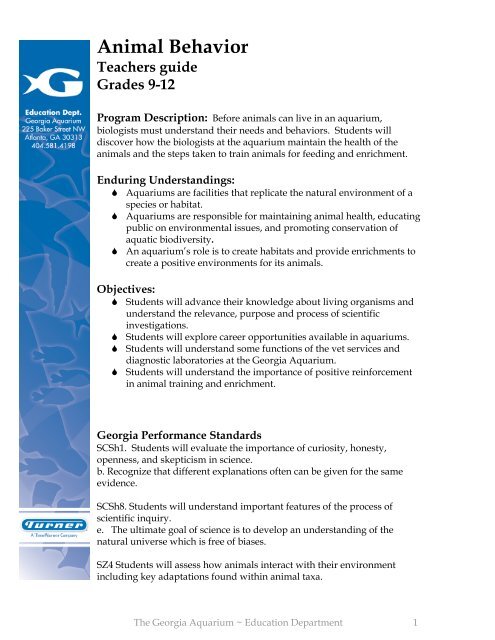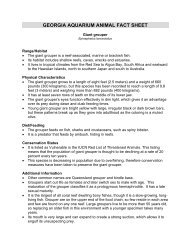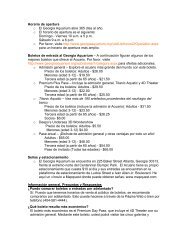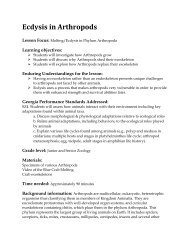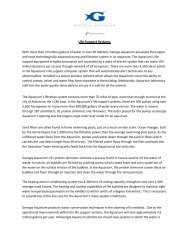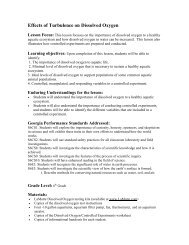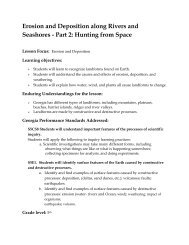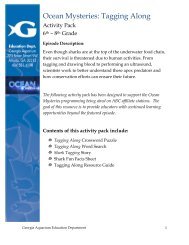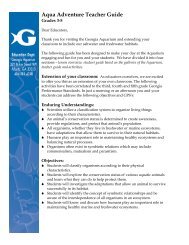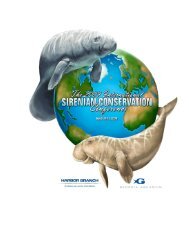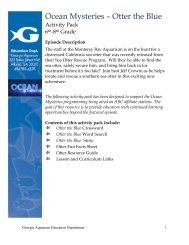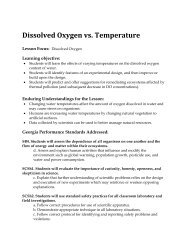Animal Behavior - Georgia Aquarium
Animal Behavior - Georgia Aquarium
Animal Behavior - Georgia Aquarium
Create successful ePaper yourself
Turn your PDF publications into a flip-book with our unique Google optimized e-Paper software.
<strong>Animal</strong> <strong>Behavior</strong><br />
Teachers guide<br />
Grades 9-12<br />
Program Description: Before animals can live in an aquarium,<br />
biologists must understand their needs and behaviors. Students will<br />
discover how the biologists at the aquarium maintain the health of the<br />
animals and the steps taken to train animals for feeding and enrichment.<br />
Enduring Understandings:<br />
<strong>Aquarium</strong>s are facilities that replicate the natural environment of a<br />
species or habitat.<br />
<strong>Aquarium</strong>s are responsible for maintaining animal health, educating<br />
public on environmental issues, and promoting conservation of<br />
aquatic biodiversity.<br />
An aquarium’s role is to create habitats and provide enrichments to<br />
create a positive environments for its animals.<br />
Objectives:<br />
Students will advance their knowledge about living organisms and<br />
understand the relevance, purpose and process of scientific<br />
investigations.<br />
Students will explore career opportunities available in aquariums.<br />
Students will understand some functions of the vet services and<br />
diagnostic laboratories at the <strong>Georgia</strong> <strong>Aquarium</strong>.<br />
Students will understand the importance of positive reinforcement<br />
in animal training and enrichment.<br />
<strong>Georgia</strong> Performance Standards<br />
SCSh1. Students will evaluate the importance of curiosity, honesty,<br />
openness, and skepticism in science.<br />
b. Recognize that different explanations often can be given for the same<br />
evidence.<br />
SCSh8. Students will understand important features of the process of<br />
scientific inquiry.<br />
e. The ultimate goal of science is to develop an understanding of the<br />
natural universe which is free of biases.<br />
SZ4 Students will assess how animals interact with their environment<br />
including key adaptations found within animal taxa.<br />
The <strong>Georgia</strong> <strong>Aquarium</strong> ~ Education Department 1
. Relate animal adaptations, including behaviors, to the ecological roles<br />
played by animals<br />
SZ5 Students will evaluate the relationships between humans and other<br />
animals.<br />
d. Explain how humans can preserve animal diversity in captive<br />
environments with regard to habitat creation, research, animal<br />
enrichment, diet, medical, and captive breeding programs.<br />
Activities:<br />
1. Are Beluga Whales Smart?<br />
The <strong>Georgia</strong> <strong>Aquarium</strong> ~ Education Department 2
Are Beluga Whales Smart?<br />
Objectives: Students will think critically about common beliefs, determine what is<br />
fact vs. opinion, and develop skill necessary to recognize scientific research as a<br />
resource.<br />
Grades: 9-12<br />
Time Need: Prep 25 min., Classroom 45 min.<br />
Materials:<br />
• Resource List – one per group<br />
• Copies of assigned readings<br />
• Books or access to a library<br />
• Computer with internet access<br />
Background Information:<br />
The Beluga whales are one of the most popular animals at the <strong>Georgia</strong> <strong>Aquarium</strong>.<br />
People often ask “Are Beluga whales smart?” The answer to this question is that<br />
scientists really do not know. When browsing the Internet to research beluga<br />
intelligence, over 18,000 results are cited. It is important to question how many of<br />
these sources are based on a scientific study versus the opinions of those who have<br />
interpreted the facts.<br />
Popular belief however is that belugas are intelligent, but how can science test this<br />
hypothesis? We measure human intelligence by using standards like IQ tests, but<br />
even standardized testing for humans in imperfect and methods can be controversial.<br />
Scientists look at many aspects of intelligence, such as size and structure of the brain<br />
in animals verse humans. From there, they have studied learning capabilities,<br />
communication, behavioral complexity and social structures, self-awareness and<br />
comparative cognition of dolphins to humans and other animals.<br />
Procedure:<br />
Part 1<br />
1. Begin by asking your students to close their eyes and to raise their hands only if<br />
they agree with the following statements. Ask them in this order and one at a time.<br />
Record the number of hands raised.<br />
a. Beluga whales are intelligent<br />
b. It is scientific fact that beluga whales are intelligent<br />
2. Share the results with the class.<br />
3. Ask a student who raised a hand for both questions to explain how we know<br />
dolphins are intelligent.<br />
4. Ask another student who did not raise a hand to explain why it is not scientific fact.<br />
Discuss that science is the study of the physical world using systemic observation and<br />
experiments’ to test hypotheses and prove or disprove theories.<br />
The <strong>Georgia</strong> <strong>Aquarium</strong> ~ Education Department 3
5. Ask the students why they need to keep their eyes closed. Explain that their<br />
answers could have been influenced by the other students in the class.<br />
6. Introduce the word bias and discuss how it can complicate scientific study.<br />
7. Finally, ask your students to define the words fact and opinion. Is the statement<br />
“Beluga whales are intelligent” fact or opinion? The exercise part two will help you<br />
find out.<br />
Part 2<br />
1. From the resources listed, pick two that provide a good overview of beluga<br />
intelligence, one based on scientific study and one sharing more opinions. Make<br />
copies of the excerpts if needed.<br />
2. Divide your class into groups of three or four and give each group the two assigned<br />
readings. Instruct them to answer the following for each source:<br />
a. Does the source list references of scientific studies, popular media or nothing<br />
at all?<br />
b. Is the source tied to valid research institution including colleges, universities,<br />
professional organizations, etc?<br />
c. Does the source include information that appears to be biased?<br />
d. Does the source include information that is anthropomorphic?<br />
e. Write down three statements from the readings that you feel are opinions.<br />
f. Write down three statements from the reading that you feel are scientific<br />
facts. Can you find two additional sources for each fact that give scientific<br />
references?<br />
3. Once the assignment is complete, ask the students to share their answers and<br />
discuss the results. Ask them again if the statement “Beluga whale are intelligent” is a<br />
scientific fact. Hopefully, fewer will raise their hands. Why is it difficult to say the<br />
statement is scientific fact? Discuss the background information. Discuss other<br />
possible ways to test animal intelligence.<br />
Assessment:<br />
Ask the each student to write down three common beliefs about an animal that could<br />
be fact. Ask them to poll at least 10 people on their thoughts on whether or not the<br />
common beliefs are a fact or not and write down the results of the poll. Afterward<br />
have the student research each common belief and write down at least three valid<br />
sources for each that verify whether it is actually based on facts or opinions.<br />
Resources:<br />
Books<br />
Encyclopedia of Marine Mammals by William Perrin, Bernd Wursig, and J.G.M.<br />
Thewissen. (all facts based on scientific research)<br />
Masters of the Ocean Realm; Whales, Dolphins, & Porposies by John heyning. p. 41.<br />
(mostly facts based on scientific research with some opinions shared)<br />
The <strong>Georgia</strong> <strong>Aquarium</strong> ~ Education Department 4
The Nature Company Guides Whales, Dolphins & Porpoise by Mark Carwardine et. Al.<br />
and Time-Life Books. (some facts based on scientific research with some opinions<br />
shared)<br />
Whale, Dolphin, and Porpoises by Sir Richard Harrison and Dr. M. M. Bryden. (mostly<br />
facts based on scientific research with some opinions shared)<br />
Whales and Dolphins in Question by James Mead and Joy Gold (some facts based on<br />
scientific research with some opinions shared)<br />
Web sites<br />
http://www.ammpa.org/faqs.html#4<br />
Brief overview and great comprehensive information on whales<br />
http://en.wikipedia.org/wiki/Cetacean_intelligence<br />
Overview with multiple sources both scientific and popular media<br />
http://www.experiencefestival.com/beluga_whale_-_taxonomy_and_evolution<br />
http://www.experiencefestival.com/whale-whale_intelligence<br />
Multiple articles from many sources<br />
CREDIT<br />
This activity was adapted from Inquiring Minds Want to Know, Seven Essential<br />
Principles for Ocean Literacy: An Activity Guide for Educators, a resource of Dolphin<br />
Quest. For more information please visit www.dolphinquest.org<br />
The <strong>Georgia</strong> <strong>Aquarium</strong> ~ Education Department 5


